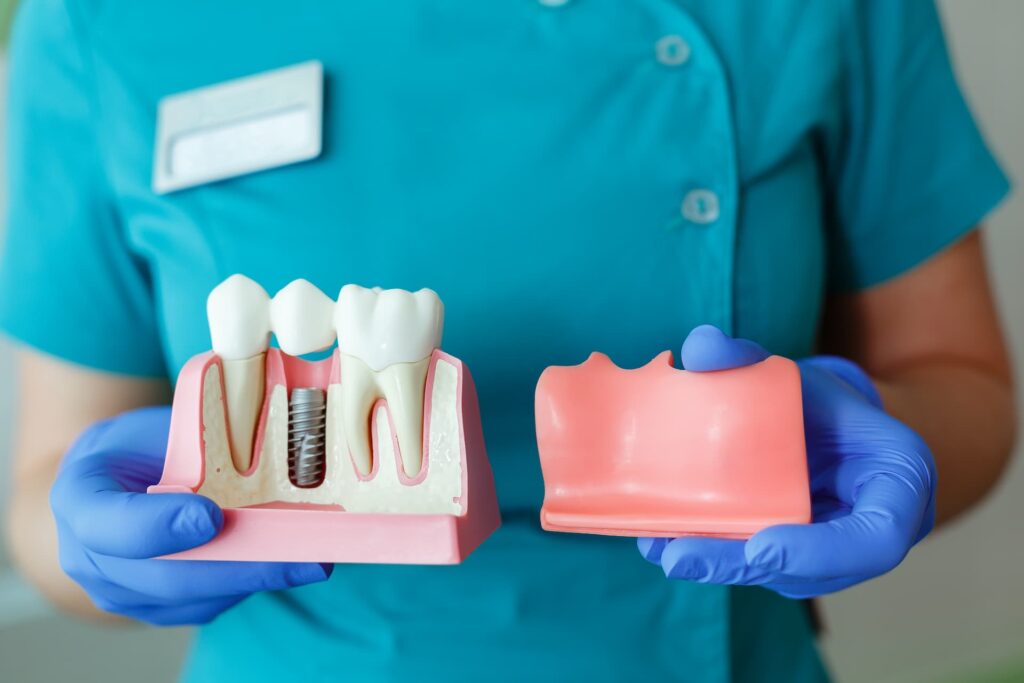Are you thinking about getting dental implants but wondering how long they will last? Well, you’ve come to the right place!
Dental implants are a popular and effective solution for missing teeth, and they can last a long time with proper care. In fact, dental implants have a higher success rate and longevity compared to other tooth replacement options. But, just like any dental procedure, it’s important to understand the factors that can affect the lifespan of your dental implants.
So, let’s dive in and explore the longevity of dental implants, so you can make an informed decision about your oral health.
5 Factors Affecting the Longevity of Dental Implants
A dental implant is a long-term solution for missing teeth, and its longevity depends on several factors.
These factors include the type of implant material, the quality of the implant placement, the patient’s oral health, lifestyle habits, and regular maintenance and follow-up care.
Type of implant material
The type of material used for the implant is an important factor in determining its longevity. Titanium and titanium alloy materials are commonly used for dental implants, as they show high biocompatibility, strength, and durability.
Quality of the implant placement
The quality of the implant placement, as well as the surgical technique used, also plays a role in the longevity of the implant. A dentist with experience in implant placement is essential to ensure the implant is placed correctly and securely.
Patient’s oral health
The patient’s oral health is an important factor in determining the longevity of the dental implant. Proper oral hygiene is essential to keep the implant clean and free of plaque and tartar, as well as to avoid any gum or bone diseases.
Patient’s lifestyle habits
The patient’s lifestyle habits can also affect the longevity of the implant. Habits such as smoking, drinking alcohol, and not getting enough sleep can weaken the implant and reduce its lifespan.
Regular maintenance and follow-up care
Regular maintenance and follow-up care are essential to ensure the implant is functioning properly. Regular visits to the dentist for check-ups and cleanings are necessary to maintain the health of the implant.

Average Lifespan of Dental Implants
The average lifespan of a dental implant is 10-15 years, depending on the patient’s oral hygiene, the skill of the surgeon, and the type of implant used.
Studies on the longevity of dental implants
Studies show that dental implants can last upwards of 25 years when cared for properly, although the expected lifespan of a dental implant is 10-15 years.
Expected lifespan of dental implants
The expected lifespan of a dental implant depends on the health of the patient, the skill of the surgeon, and the quality of the implant used. Generally, dental implants should last 10-15 years, although studies have shown them to last up to 25 years with proper care and maintenance.
How to Prolong the Lifespan of Dental Implants
From proper oral hygiene to regular dental checkups, there are several things you can do to help your implants stay healthy and functional for years to come.
So, let’s dive in and learn how to keep your smile shining bright!
1. Practice oral hygiene best practices
Good oral hygiene practices are essential for the longevity of dental implants.
- Brush your teeth twice a day. Brush your teeth with a soft-bristled toothbrush at least twice a day, using fluoride toothpaste. Brush gently around the implant site, taking care not to scrub too hard, as this can cause damage to the gum tissue.
- Floss daily. Flossing is an essential part of oral hygiene, especially around dental implants. Use dental floss or interdental brushes to clean the areas between the teeth and around the implants, where food and bacteria can accumulate.
- Use an antibacterial mouthwash. Rinse your mouth with an antibacterial mouthwash to help kill bacteria and freshen your breath. Look for a mouthwash that is specifically designed for dental implants, as some mouthwashes can contain alcohol or other harsh ingredients that may damage the implant.
- Quit smoking. Smoking can cause several oral health problems, including implant failure. It can decrease the success rate of dental implants, as it can cause the gums to recede, leading to increased wear and tear. If you smoke, quitting can help reduce the risk of implant failure and improve your overall oral health.
- Maintain a healthy diet. Eating a healthy diet can help keep your teeth and gums healthy. Avoid sugary and acidic foods and drinks, which can contribute to tooth decay and gum disease.
By following these oral hygiene best practices, you can help keep your dental implants healthy and functional for years to come.
2. Go to regular dental check-ups and cleanings
Visiting the dentist for regular check-ups and cleanings is essential for the maintenance of your dental implants.
During these visits, your dentist will check the health of the implant, the surrounding teeth, and the gum tissue. They may also take x-rays to check for any signs of decay or infection.
Additionally, they will clean the implant to remove any built-up plaque or tartar that could lead to damage.
3. Avoid grinding your teeth
It is important to manage any risk factors that could affect the longevity of your dental implants. This includes grinding teeth. Grinding teeth can also put extra strain on the implant, leading to increased wear and tear.
4. Get follow-up care and maintenance of dental implants
Regular follow-up care and maintenance are essential for the longevity of dental implants. This includes visiting the dentist for regular check-ups and cleanings, as well as managing risk factors such as smoking or grinding teeth.
Additionally, it is important to brush and floss regularly and use an antibacterial mouthwash. Following these steps can help to prolong the lifespan of your dental implants.

Replacement of Dental Implants
A dental implant is a surgical procedure that replaces missing teeth with artificial ones. The implants are made of titanium and are inserted into the jawbone where natural teeth once were.
The implant is then covered with a dental crown that looks like a real tooth. Replacement of a dental implant involves removing the old implant and replacing it with a new one. The process is similar to that of the initial implant placement and can be done in a single visit or over several visits.
Reasons for dental implant replacement
Dental implants may need to be replaced due to a variety of reasons. These include:
- infection
- damage to the implant, or
- a lack of proper care
The jawbone may have shifted or changed shape over time, requiring a new implant. Implants may also need to be replaced due to wear and tear from everyday use.
How dental implant replacement works
The process of dental implant replacement is relatively straightforward.
- First, the dentist will examine the implant and determine if it needs to be replaced. The dentist will then anesthetize the area and remove the old implant.
- Next, the dentist will place the new implant into the jawbone and secure it with a titanium screw.
- Finally, the dentist will cover the implant with a dental crown to give it the appearance of a real tooth.
Cost and considerations of dental implant replacement
The cost and considerations of dental implant replacement will vary depending on the individual’s situation. In general, replacement implants can cost anywhere from a few hundred dollars to several thousand dollars.
Additionally, there are certain risks associated with the procedure, such as nerve damage and infection. Before deciding to replace a dental implant, it is important to discuss the risks and costs with a dentist.
FAQs About The Longevity Of Dental Implants
How often do dental implants need to be replaced?
Dental implants are designed to be a long-lasting solution for missing teeth. While they can last a lifetime with proper care, there is no guarantee that they will never need to be replaced. However, it’s important to note that dental implant failure is relatively rare, and most implants can last for decades with proper care and maintenance.
Can dental implants last a lifetime?
Yes, dental implants can last a lifetime with proper care and maintenance. However, it’s important to remember that dental implant success depends on several factors, including oral hygiene habits, lifestyle factors, and overall health. Regular dental checkups and good oral hygiene habits can help ensure the longevity of your dental implants.
Can I have all my teeth removed and replaced with implants?
Yes, it is possible to have all of your teeth removed and replaced with dental implants. This is known as a full mouth reconstruction or full arch replacement. However, this is a complex and expensive procedure that requires careful planning and consultation with a dental specialist.
Do dental implants hurt years later?
It is uncommon for dental implants to cause pain years after they are placed. However, there are some cases where patients may experience discomfort or pain due to issues such as implant failure, infection, or gum disease. If you experience any pain or discomfort around your dental implants, it’s important to see your dentist as soon as possible to determine the cause and receive appropriate treatment.
Conclusion
Dental implants can last between 10-15 years, but it is possible for them designed to last a lifetime if proper maintenance and care is taken.
This means regular dental checkups and care, such as brushing and flossing, should be taken to ensure the longevity of the implant. However, regular evaluation and maintenance by a dentist are essential for the continued success of the implant.
But the trick? Ensure you use a quality and trustworthy dental service for your implants. Hanna Dental will help with regular dental checkups and advise how to care for the implants to ensure the longevity of the implant.



